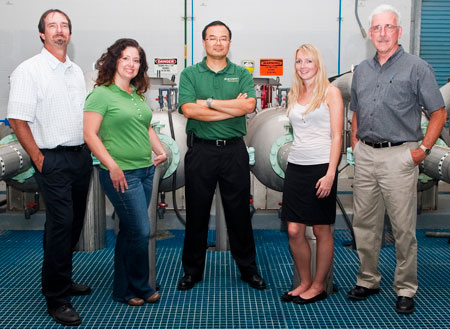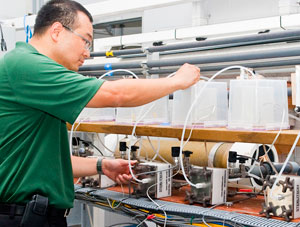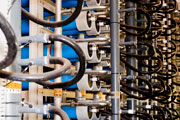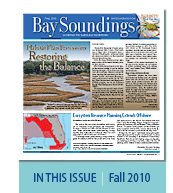 |
||||||||
Water Conservation Puts Dunedin in International Spotlight
 Photos: Aimee Blodgett, USF
Photos: Aimee Blodgett, USF
An international team convened in Dunedin earlier this year. From left to right are Paul Stanek, Dunedin water director, Ellen Spencer, a graduate student from the University of Birmingham in the UK, USF professor Daniel Yeh, USF graduate student Pacia Hernandez, and Ken Stidham, Dunedin's wastewater director.
Known around the world for its award-winning beaches, Dunedin can now bask in the international spotlight for its long-time focus on water conservation. It was recently selected as the first city in North America to become part of the SWITCH project, an international network of 33 partners from 15 countries who are working together to create sustainable urban water management practices.
Supported by both the European Union and the United Nations, SWITCH is helping local water managers move away from their current ad hoc practices to a more integrated approach that focuses on the entire water cycle.
“We’ve been working toward this for the past three years,” notes Daniel Yeh, a professor of civil and environmental engineering at the University of South Florida. “The City of Dunedin is a great example for other coastal cities around the world — they’re a very forward-looking city and they’re doing good things.”
Unlike most communities in Tampa Bay, Dunedin operates its own urban well field with a reverse-osmosis plant to soften rather than desalinate groundwater. It also reuses most of its wastewater and is looking at ways to reuse stormwater.
The city’s long-time focus on water conservation is obvious in its per capita water use — 63.3 gallons per day vs. more than 100 gallons in Pinellas and Hillsborough counties. In fact, the city’s total water use has declined even as its population continues to grow.
Being part of SWITCH will allow the city to take advantage of the latest technologies as well as provide a forum where other cities can learn from Dunedin’s example, adds Tom Burke, city engineer.
“Residents have taken up the water conservation flag,” says Paul Stanek, director of the city’s water division. “Because we’re our own supplier with our own network of wells, we react more quickly to droughts and high usage.”
For instance, once-a-week irrigation that’s now standard across the region was implemented in Dunedin nearly 20 years ago. New automatic reading devises being installed now will alert the city when a meter runs continuously for 24 hours, signaling a potential leak that might otherwise go undetected for days or even weeks.
International Collaboration
 Yeh and his students use the city's water and wastewater facilities as working laboratories.
Yeh and his students use the city's water and wastewater facilities as working laboratories.As part of the SWITCH program, Dunedin joins 10 other coastal cities around the world, all of them much larger but none of them as advanced as Dunedin in terms of tracking water use and re-use, Yeh said.
“Through a collaboration with the University of Birmingham in the United Kingdom, we are modeling all of the city’s water resources and infrastructure in an integrated fashion using a scoping tool called CityWater Balance,” said Yeh. The tool is intended to provide city planners and engineers with a means of integrating previously disparate data. It will enable them to look at the entire water balance of the city and explore a broad range of outcomes regarding demand, quality, energy consumption and cost as they plan for the future.
First, however, the system needs to be tested. Mountains of data about virtually every aspect of a city’s water systems were collected and run through the model. Ellen Spencer, a graduate student from UB, made the journey “across the pond” early this summer to gather first-hand data about the city’s water systems, how they connect, and how they impact each other.
“We needed to cast a really wide net, so the data I collected is quite a big list,” said Spencer, ticking off an inventory including maps of city land use and pipe systems for potable water, waste water and reclaimed water; data about soils, storm water catchments, aquifer properties and the volumes of water pumped; and information about lakes, ponds, creeks, road runoff and infiltration. “I was even lucky enough to be shown some of the sewage pumping stations and given a guided tour of the storm water catchment area.”
Spencer also worked with USF graduate student Pacia Hernandez who is conducting research on the water-energy nexus. “You need energy to move water, and you need water to create energy. It’s kind of a vicious cycle. That’s why there is a big push for reusing water and for alternative water uses like rainwater and air condensate recovery,” said Hernandez. “Using the CityWater Balance model, we hope to see where we can incorporate these uses and cut down on the energy usage and carbon footprint and create other benefits to the city.”
That data will be compared with similar – although less comprehensive — results from other coastal cities including Accra, Ghana, Lodz, Poland and Alexandria, Egypt. “The city of Dunedin is the smallest of the SWITCH cities, but had more data than any of the others,” Yeh said.
Local Benefits
 USF's long-time partnership with Dunedin was instrumental in the city building one of the region's first reverse osmosis facilities.
USF's long-time partnership with Dunedin was instrumental in the city building one of the region's first reverse osmosis facilities.Along with the international benefits expected from the SWITCH program, Dunedin has made its water and wastewater facilities available to USF students as a working classroom. “We’re experiencing a critical shortage in human capital in water technologies, from engineers to operators,” Yeh said. “Opening their treatment plants as learning laboratories gives students hands-on experience they might not be able to get otherwise.”
As part of that initiative, one graduate student is developing a new technology that may change the way reverse-osmosis works by dramatically improving the performance of the membranes that filter water, he added.
And while the SWITCH affiliation is new, the city’s commitment to sustainability isn’t. Dunedin was one of the first cities in the state to earn a “green city” designation from the Florida Green Building Coalition, and its community center was one of the first green buildings in the Tampa Bay region. The city council is currently working with a developer to finalize permitting for the region’s first “green roof.”
“We’re rewriting the city’s building code to focus on sustainability so that building green is the normal rather than the unusual,” said Valerie Lane, the city’s sustainability coordinator. “A lot of us live here and we know we need to save those resources for the next generation.”
